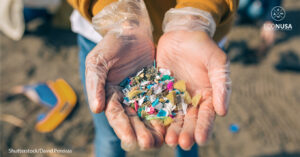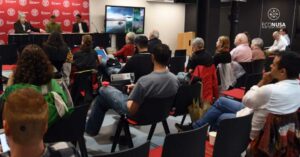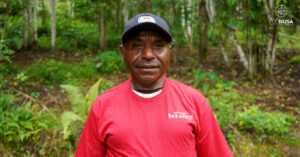
Unique tradition of Tonotwiyati was once bringing Enggros Village to the prominent mention at national level through a National Village Contests in 2016.
“Our women forest is unique. We were the third winner. During the national village contest, I explained the women forest and how we conserve mangrove forest through our tradition,” said Orgenes Meraudje, the chief of Enggros Village, in Hachnuk Beach.
Many high-ranking officials and tourists paid a visit the women forest. They usually came together to observe the Tonotwiyat procession. “In January 2021 there is a plan for international tourists who will visit here. I usually escort them,” said Mama Yos enthusiastically.
Unwritten Tradition to Conserve Women Forest
There are some rules with which women should comply when they earn for living in the women forest. Prior to visiting the forest, the women should not be in quarrel with family or have domestic problem. They are banned from talking dirty or mean words. During menstruation, women must not dip themselves into the mud.
Besides, the women keep the sustainability rules for the sake of environmental conservation. “We are here bringing a little meal. Usually we only bring water. If too many to bring, we will produce more trash,” said Mama Yos.
To conserve the women forest, cutting tree carelessly are prohibited. If one wants to take firewood, they should pick up the falling branches. Mama Yos said that the villagers have never targeted the number of catches to bring home. They believe that God has portioned each people’s blessing. If they got plenty, they are grateful. If they got less, it is no big deal. Therefore, they are not allowed to bring any container during fishing. This kind of mindset can maintain the population of the catches and prevent from massive exploitation.
Threatening Trash to Women Forests
Despite the fact that the local community keeps making every effort to conserve the women forest, mangrove remains under threat. There are many trashes sticking on the mangrove roots. Some plastic bottles are floating on the muddy water. Bag, shoe, chair are among the waste clutching on the roots.
The more trash, the more mosquitoes there will be in the forest. Many times EcoNusa team’s boat was unstable due to the mosquitoes attack. “Now there are many trashes floating from the city, from Hamadi or Entrop. Trash destroys forest. It will be hard for us to seek bia. There are many mosquitoes here annoying us,” said Mama Yos.
The trash pollutes oyster, fish, shrimp and crab habitats. Oyster is easily caught. But waste on the muddy water disrupted the catches. “We usually can get many oysters but now it is covered by trash. When we dive, we should step on the trash to get the bia,” she added.

Massive development in the Youtefa Bay region has increased the pollution in the women forest areas. With the inauguration of Holtekamp bridge connecting Jayapura City and Skouw, bordering with Papua New Guinea, the land use change of mangrove in the women forest continues to happen. Moreover, the recent development of rowing arena for the XX National Sport (PON) that opens the areas of women forest will impact the villagers of Enggros.
“PON affected us as the local villagers. At the time there was flooding that inundated our village assembly due to the absence of mangrove trees as the buffer,” she said.
According to Mama Yos, when it continues to happen, the women forest will only be remembered as history. The community should fight together to articulate the damages. Tonotwiyat tradition should be passed on to the next generation so the young generation could understand the real condition of mangrove forests. But, not many young peoples has that concern.
“There is only small number of young girls seeking bia. Most girls now are eager for instant stuffs. If not them, who will look after the forest in the future,” Mama Yos said.
Waste Cleanup to Conserve Women Forest
Building awareness on the importance of women forest conservation is urgent. Mangrove ecosystem is the source of livelihood of Enggross community and serves as the habitat of biodiversity and the buffer zone preventing abrasion.
To support this bid, EcoNusa in cooperation with many local communities, student organizations, and government institutions initiated beach cleanup action along the coastline of women forest. The location was at Jalan Hamadi and Youtefa Bay areas on 6 December 2020.
The beach cleanup is expected to reduce the number of waste floating in the women forests. Beach cleanup will also call the community to build more awareness on the importance of saving the existing mangrove ecosystem, particularly the women forest. Forest is closely related to the tradition from generation to generation, particularly to the local women in Enggros.
Read Women Forest, Mangrove Conservation by Enggros Women (Part I) here.
Editor: Leo Wahyudi & V Arnila Wulandani









